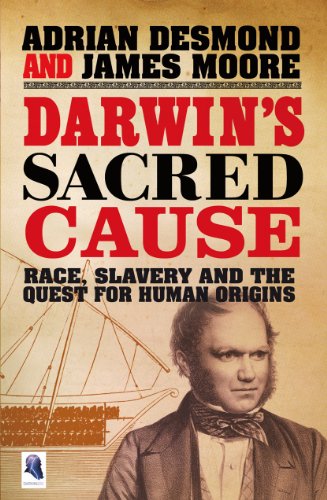
12TH FEBRUARY 2025
Dear Friend of Darwin,
Today marks the 216th anniversary of Charles Darwin’s birth… Happy Darwin Day!
By a pleasing coincidence, today also marks the 216th anniversary of the birth of Abraham Lincoln. The two men have more than their date of birth in common: both bore trademark beards; both had cities named after them; and both detested slavery.
Writing to his American friend the botanist Asa Gray shortly after the outbreak of the American Civil War, Darwin regretted Lincoln’s failure to mention the abolition of slavery in his recent message to Congress, in which he had first detailed the purpose of the war:
I cannot believe that the South would ever have fellow-feeling enough with the North to allow of government in common. Could the North endure a Southern President? The whole affair is a great misfortune in the progress of the World; but I shd not regret it so much, if I could persuade myself that Slavery would be annihilated. But your president does not even mention the word in his Address.— I sometimes wish the contest to grow so desperate that the north would be led to declare freedom as a diversion against the Enemy. In 50 or 100 years your posterity would bless the act.— But Heaven knows why I trouble you with my speculations; I ought to stick to Orchids.
As is explained on the Library of Congress website, Darwin was by no means alone in wishing Lincoln to be more radical in his anti-slavery policies, but Lincoln felt constrained by the U.S. Constitution and other concerns:
Almost from the beginning of his administration, abolitionists and radical Republicans pressured Abraham Lincoln to issue an Emancipation Proclamation. Although Lincoln personally abhorred slavery, he felt confined by his constitutional authority as president to challenge slavery only in the context of necessary war measures. He also worried about the reactions of those in the loyal border states where slavery was still legal. Lincoln is said to have summed up the importance of keeping the border states in the Union by saying “I hope to have God on my side, but I must have Kentucky.”
A recently inaugurated U.S. president who felt bound by the constitution, and who took into account differing views… What a notion!
Natural selection

A book you might enjoy:
Darwin’s Sacred Cause by Adrian Desmond and James Moore.
A book exploring how Charles Darwin’s abhorrence of slavery influenced his science.
Missing links
Some Darwin-related articles you might find of interest:
- Caricatures of Darwin and evolution
A new online collection of hundreds of caricatures and satirical images referring to Darwin and evolution (from the wonderful Darwin Online, obviously). - The naturalist and the neurologist: on Charles Darwin and James Crichton-Browne
An exploration of Charles Darwin’s photograph collection, including portraits of mental patients given to him by the neurologist James Crichton-Browne, who provided information for Darwin’s book The Expression of the Emotions in Man and Animals. - Beyond evolution: Alfred Russel Wallace’s critique of the 19th century world
Wallace’s observations of social exploitation in Wales and the Indonesian Archipelago compelled him to take a stand against the British establishment. He also recognised the ecological destruction caused by colonialism, making him one of the world’s first global environmentalists. - ‘A neural fossil’: human ears try to move when listening, scientists say
Researchers have found that, while most humans can’t move their ears, vestiges of our ancestors’ ear-orienting system remain in what has been called a ‘neural fossil’.
Original paper: Electromyographic correlates of effortful listening in the vestigial auriculomotor system - Reflections on punctuated equilibria
Fifty years after its publication, Niles Eldredge reflects on his influential paper, jointly written with the late Stephen Jay Gould, on ‘punctuated equilibria’ in evolution. - How—and how not—to think about the role randomness plays in evolution (video)
Evolution isn’t linear and it doesn’t have a masterplan—a microbiologist explains the role of randomness in the process - Barn swallow research offers real-time insight on how new species form
Biologists have used genetic sequencing from barn swallows around the world to provide evidence that sexual selection, in which organisms choose mates based on traits they find attractive, drives the emergence of new species. - Why do plants wiggle? Scientists solve age-old mystery that puzzled Charles Darwin
A study has revealed that sunflowers’ erratic movements help them locate sunlight. - Explosive pollen wars: plants fight for pollen-space on pollinators
Scientists have provided empirical evidence that pollen grains of rival plants may compete with one another for space on pollinators.
Journal of researches
Since the last newsletter, I reached two major Darwinian milestones: I completed reading all 30 volumes of Darwin’s correspondence, and, I finally completed the first(-and-a-halfth) draft of my book Through Darwin’s Eyes. At 100,000 words, it now needs to evolve into something leaner and better adapted for future readers.
Expression of Emotions
Thanks as always for reading this newsletter. I’m hoping to make them a bit more frequent than they have been—but not too frequent.
If you know anyone who might enjoy this newsletter, please share it with them. Personal recommendations are the best way to spread the word.
See you next time!
Richard Carter, FCD
friendsofdarwin.com
richardcarter.com
Places to follow me:
Friends of Charles Darwin: Blog • Newsletter • Reviews • Articles • RSS
Personal: Blog • Newsletter • Reviews • Moor book • Darwin book • RSS
Social: Bluesky • Mastodon • Substack • Instagram

Leave a Reply